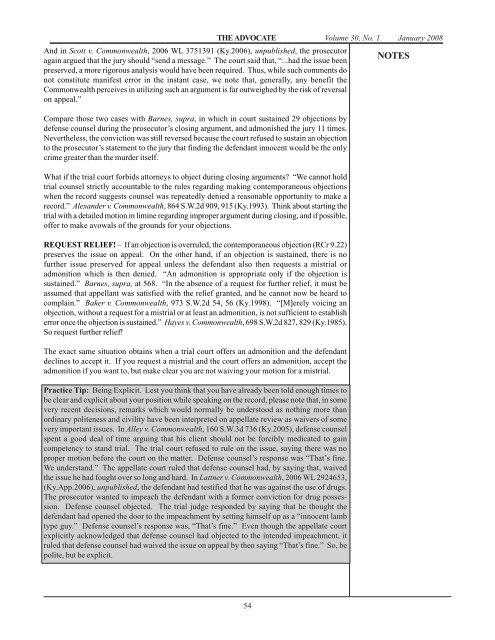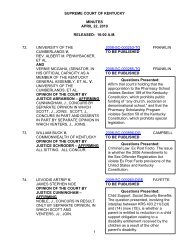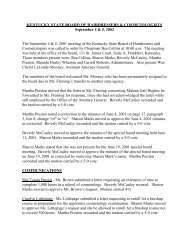Jan08 Advo.pmd - e-archives Home
Jan08 Advo.pmd - e-archives Home
Jan08 Advo.pmd - e-archives Home
Create successful ePaper yourself
Turn your PDF publications into a flip-book with our unique Google optimized e-Paper software.
THE ADVOCATE Volume 30, No. 1 January 2008<br />
And in Scott v. Commonwealth, 2006 WL 3751391 (Ky.2006), unpublished, the prosecutor<br />
again argued that the jury should “send a message.” The court said that, “...had the issue been<br />
preserved, a more rigorous analysis would have been required. Thus, while such comments do<br />
not constitute manifest error in the instant case, we note that, generally, any benefit the<br />
Commonwealth perceives in utilizing such an argument is far outweighed by the risk of reversal<br />
on appeal.”<br />
Compare those two cases with Barnes, supra, in which in court sustained 29 objections by<br />
defense counsel during the prosecutor’s closing argument, and admonished the jury 11 times.<br />
Nevertheless, the conviction was still reversed because the court refused to sustain an objection<br />
to the prosecutor’s statement to the jury that finding the defendant innocent would be the only<br />
crime greater than the murder itself.<br />
What if the trial court forbids attorneys to object during closing arguments? “We cannot hold<br />
trial counsel strictly accountable to the rules regarding making contemporaneous objections<br />
when the record suggests counsel was repeatedly denied a reasonable opportunity to make a<br />
record.” Alexander v. Commonwealth, 864 S.W.2d 909, 915 (Ky.1993). Think about starting the<br />
trial with a detailed motion in limine regarding improper argument during closing, and if possible,<br />
offer to make avowals of the grounds for your objections.<br />
REQUEST RELIEF! – If an objection is overruled, the contemporaneous objection (RCr 9.22)<br />
preserves the issue on appeal. On the other hand, if an objection is sustained, there is no<br />
further issue preserved for appeal unless the defendant also then requests a mistrial or<br />
admonition which is then denied. “An admonition is appropriate only if the objection is<br />
sustained.” Barnes, supra, at 568. “In the absence of a request for further relief, it must be<br />
assumed that appellant was satisfied with the relief granted, and he cannot now be heard to<br />
complain.” Baker v. Commonwealth, 973 S.W.2d 54, 56 (Ky.1998). “[M]erely voicing an<br />
objection, without a request for a mistrial or at least an admonition, is not sufficient to establish<br />
error once the objection is sustained.” Hayes v. Commonwealth, 698 S.W.2d 827, 829 (Ky.1985).<br />
So request further relief!<br />
The exact same situation obtains when a trial court offers an admonition and the defendant<br />
declines to accept it. If you request a mistrial and the court offers an admonition, accept the<br />
admonition if you want to, but make clear you are not waiving your motion for a mistrial.<br />
Practice Tip: Being Explicit. Lest you think that you have already been told enough times to<br />
be clear and explicit about your position while speaking on the record, please note that, in some<br />
very recent decisions, remarks which would normally be understood as nothing more than<br />
ordinary politeness and civility have been interpreted on appellate review as waivers of some<br />
very important issues. In Alley v. Commonwealth, 160 S.W.3d 736 (Ky.2005), defense counsel<br />
spent a good deal of time arguing that his client should not be forcibly medicated to gain<br />
competency to stand trial. The trial court refused to rule on the issue, saying there was no<br />
proper motion before the court on the matter. Defense counsel’s response was “That’s fine.<br />
We understand.” The appellate court ruled that defense counsel had, by saying that, waived<br />
the issue he had fought over so long and hard. In Lattner v. Commonwealth, 2006 WL 2924653,<br />
(Ky.App.2006), unpublished, the defendant had testified that he was against the use of drugs.<br />
The prosecutor wanted to impeach the defendant with a former conviction for drug possession.<br />
Defense counsel objected. The trial judge responded by saying that he thought the<br />
defendant had opened the door to the impeachment by setting himself up as a “innocent lamb<br />
type guy.” Defense counsel’s response was, “That’s fine.” Even though the appellate court<br />
explicitly acknowledged that defense counsel had objected to the intended impeachment, it<br />
ruled that defense counsel had waived the issue on appeal by then saying “That’s fine.” So, be<br />
polite, but be explicit.<br />
54<br />
NOTES













